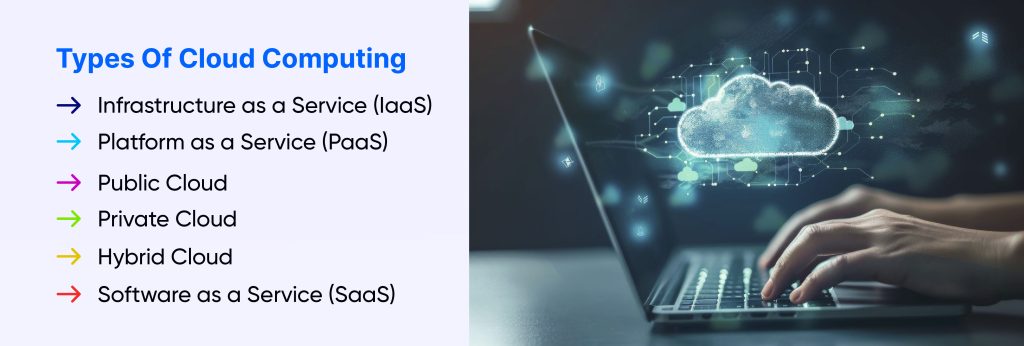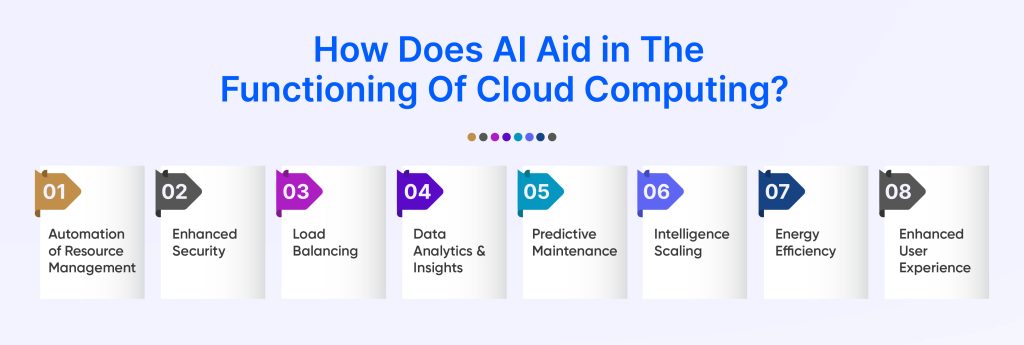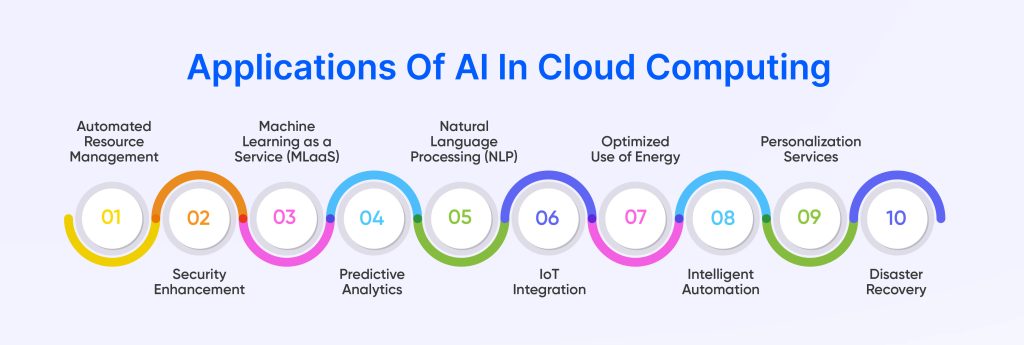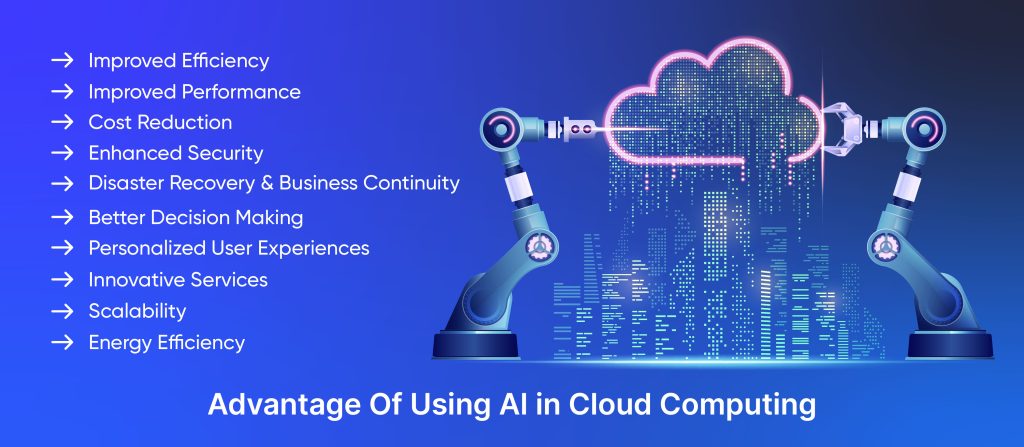When teams operate independently, it creates communication gaps that can lead to disorder. In contrast, when teams collaborate, they tend to be more efficient.
AI in Cloud computing is transforming how individuals, businesses, and industries handle data storage, processing, and application creation in today’s rapidly changing digital landscape. Cloud computing represents a fundamental leap, transforming traditional on-premises infrastructure into a dynamic, scalable architecture. This paradigm takes advantage of the capabilities of distant servers, networks, and services available via the internet. According to Mordor Intelligence, the cloud AI industry is expected to grow from USD 51.04 billion in 2023 to a hefty USD 207.40 billion by 2028. This estimate shows a fantastic Compound Annual Growth Rate (CAGR) of 32.37% from 2023 to 2028.
Businesses have long struggled with the constraints of on-premises infrastructure, making it difficult to respond to changing computing demands and improve resource use. The introduction of cloud computing first provided a lifeline by freeing enterprises from the constraints of physical hardware, allowing on-demand access to faraway servers and services via the internet.
Cloud computing AI is a disruptive technology that is changing the way data is stored, accessed, and processed. Essentially, it means providing computing resources—servers, storage, databases, software, and applications—over the Internet. Cloud computing, as opposed to traditional reliance on physical infrastructure, stores and processes data over a network of remote computer systems accessible via the internet.
Security is a critical component of cloud services, with providers using sophisticated methods like encryption, firewalls, and access limits to protect data from unauthorized access. The intrinsic advantage of cloud storage is its resilience: even if local devices are destroyed, lost, or stolen, data is safe in the cloud.
Cloud computing is a technology that allows individuals and businesses to access computing resources over the internet, on-demand. This can include servers, storage, databases, networking, software, analytics, and intelligence. Instead of owning and maintaining physical servers and data centers, users can rent access to anything from applications to storage from a cloud service provider.
The process works through virtualization, where physical servers are divided into virtual machines that can be managed and operated independently. These virtual machines are hosted in data centers scattered across various locations, providing high levels of redundancy and reliability. Users connect to these services via the internet, enabling them to configure and use computing resources without direct active management by the user.
The key components of cloud computing include Software as a Service (SaaS), Platform as a Service (PaaS), and Infrastructure as a Service (IaaS). Each offers different levels of control, flexibility, and management, making AI cloud computing versatile for various needs, from running applications to enhancing computing capacity or storing vast amounts of data. Cloud computing thus optimizes IT performance, reduces costs, and scales services according to demand, all while offering enhanced flexibility and efficiency.
AI cloud computing is the merging of artificial intelligence with cloud computing infrastructure and services. Cloud computing is the transfer of computer resources, such as processing power, storage, and applications, via the Internet on a pay-as-you-go basis. AI, on the other hand, focuses on developing computers that can execute activities that would normally need human intelligence. AI plays a crucial role in cloud computing, especially in fraud detection using machine learning. By analyzing vast amounts of data stored in the cloud, AI algorithms can detect patterns indicative of fraudulent activities, enhancing security measures for businesses.
AI and cloud computing enables customers to access and employ AI capabilities without the need to invest in and maintain specialist hardware or software infrastructure.
Cloud computing is commonly categorized into three main types based on the nature of the service provided. Each type offers different levels of control, flexibility, and management required by the user:

This is the most flexible and comprehensive type of cloud service. IaaS provides fundamental computing resources such as physical or virtual servers, storage, and networking. Users manage the operating systems, applications, and data running on the infrastructure while the cloud provider manages the hardware itself. Examples of IaaS providers include Amazon Web Services (AWS), Microsoft Azure, and Google Compute Engine.
PaaS provides customers with a platform on which applications can be developed and deployed. It includes infrastructure—servers, storage, and networking—but also middleware, development tools, business intelligence (BI) services, database management systems, and more. PaaS is designed to support the complete web application lifecycle: building, testing, deploying, managing, and updating. Examples include Google App Engine, AWS Elastic Beanstalk, and Microsoft Azure App Services.
Services are provided over the public internet and are available to anyone who wants to purchase them. The resources such as servers and storage are owned and operated by a third-party cloud service provider.
The cloud infrastructure is exclusively used by one business or organization. The private cloud can be managed by the organization itself or by a third party, and it can be hosted internally or externally.
This environment uses a mix of on-premises, private cloud, and third-party, public cloud services with orchestration between the two platforms. This allows data and applications to be shared between them, offering greater flexibility and optimization of existing infrastructure.
This type delivers software applications over the internet, on-demand, and typically on a subscription basis. With SaaS, cloud providers host and manage the software application and underlying infrastructure and handle any maintenance, such as software upgrades and security patching. Users connect to the application over the internet, usually with a web browser. Popular SaaS examples include Google Workspace, Microsoft 365, and Salesforce.
In addition to these main categories, cloud computing in AI can also be delivered in different models based on the deployment method.
Artificial Intelligence (AI) offers one more layer of abilities that help make cloud computing more functional and efficient. Here are some of the chief ways through which AI helps cloud computing:

The AI supports advanced automation within the cloud environment through the capability to automatically manage resources in a mode that guarantees efficiency in service delivery. AI’s role in cloud computing, particularly in AI business process automation, is pivotal. By leveraging machine learning and data analytics, AI automates tasks, streamlines workflows, and enhances efficiency, enabling businesses to optimize operations and unlock new levels of productivity in the cloud.
They are capable of dynamic allocation of bandwidth, compute power, and storage on real-time demand, consequently increasing efficiency in service delivery and hence reducing cost in operation.
AI can improve the enhanced security measures on cloud platforms. Using machine learning algorithms, AI can predict patterns like anomaly detection and thus recognize possible security hazards in a way far more effective than other modes followed traditionally. Therefore, it is used in proactive security to alert the identification of any unusual behavior likely to indicate a possible cyber-attack, hence enabling quicker response towards potential threats.
AI algorithms assist in balancing the work, which is vital for the stability and performance of cloud service. Based on the analysis of incoming traffic and required resources, it divides work among servers to make sure that not one of the servers gets a bottleneck.
AI is really good at deriving data insights from a huge set of data stored on servers. A model made up of machine processing huge volumes of data can develop trends helpful in the decision-making processes of businesses, make predictions, and help in the actionable insight development.
AI can predict a hardware failing or system downtime in the cloud infrastructure before it is going to fail. It continuously monitors the system’s health and performance. In such a case, AI tools can alert administrators for those parts or processes prone to failure to ensure that preventive maintenance may be affected so that there is no disruption.
AI allows cloud resources to intelligently scale down and up depending on adaption to predictive analytics and to usage patterns. This ensures that the applications have enough resources at any given time, scaling down during the off-peak usage period to get an optimum balance of costs versus performance.
AI for optimized energy use in cloud service data centers can play a great role in minimizing the level of environmental impact. It would provide better energy efficiency by using data analysis from many sensors, cooling systems, and other operations that consume power.
It is also based on the improvement of the experience of the users through the help of AI, which ensures them more personalized services and quicker, more responsive interaction with the cloud-based application. It is able to automate the operations of customer services, which will give immediate responses to the questions of users through chatbots and virtual assistants, which are AI-driven.
The integration of Artificial Intelligence and cloud computing has transformed how businesses operate by enhancing efficiency, scalability, and intelligence in services. Here are several key applications of AI in cloud computing.
The integration of Artificial Intelligence (AI) with the cloud is boosting up the new age of businesses to achieve much-improved efficiency, scalability, and intelligence of services. The following are the main areas where AI on the cloud can be used.

AI powers dynamic resource allocation to gain the highest use of computing power, storage, and networking at any given time, depending on real-time demands without human intervention. This contributes to maximizing resource efficiency and operational costs minimization.
The most important enabler of AI in cloud environments is security. The AI algorithms understand patterns of data traffic and call the attention of security personnel to anomalies, such as a possibility of potential threat, data breach, or cyber-attack. The AI-based security system can automatically undertake protective measures and alert human operators of suspicious activity.
Some cloud providers have their ML platform in place, offering businesses the power of such AI tools without making huge in-house investments. Tools include those for preprocessing data, building models, training, and scalable deployment.
AI is used for predictive insights that help businesses predict the trends of the market, customer behaviors, and possible operational issues by processing large sets of data. Such capabilities contribute to improved decision-making procedures and strategic planning within an organization.
Among the few capabilities, cloud-based AI services offer the capability of NLP. They allow the understanding and generation of human language by computers. That is where users easily interact and offer services to them more user-friendly.
AI helps in data interpretation and provides a helping hand in dealing with the management of IoT devices. In other words, cloud platforms can store and process vast amounts of IoT data. The AI processes it for the extraction of useful information and, doing this in real time, helps toward the automation of a process and making better decisions.
AI helps in optimizing the use of energy because the data centers do consume a lot of energy. AI systems help to control the optimization of temperatures and power uses within the data center in order to have a computing environment that is greener.
This AI is the driving factor behind heightened automation across intricate procedures right from the rudimentary functioning of IT to complex operational business course flows. In IT operations, for example, the environments can be set up, data backups can be done, and the errors can even be troubleshooted—all this running in a much more operationally efficient way.
AI uses the collected data from users so that it can give appropriate recommendations and content personalization during cloud-based applications usage, increasing the experience by the person and his involvement. Most use is evident in streaming services, online shops, and content platforms.
These applications demonstrate how AI and the cloud computing is not just enhancing existing capabilities but also enabling new services and innovations, reshaping industries by providing smarter, more responsive, and efficient solutions.
Artificial intelligence will enhance disaster recovery in cloud computing by assisting in forecasting some failure points and recommendations for how they can be prevented in advance. During a real disaster, the AI will be useful in orchestrating the automation of the recovery process to cut down on downtime and data loss.
There are innumerable benefits that come with the integration of Artificial Intelligence (AI) in cloud computing, massively boosting potentials, performances, and values of services offered from this network. Some of the advantages of cloud-based ai that will clearly stand out when a user integrates AI into cloud computing include:

AI takes over the routine tasks of, say, data backups, system updates, and even the security checks that traditionally required human intervention. Improved automation of operations also speeds up the pace and reduces the chance of human error, hence more efficient management of the cloud.
Resources would be dynamically provisioned according to the prediction of demand and real-time use, hence increasing efficiency in the execution of applications on the cloud. This, therefore, will mean better usage of resources for better general system performance, hence ensuring that they are not over-provisioned.
AI optimizes the operation by making the best use of resources and automation of routine tasks. This very much reduces the need for excessive hardware, reduces the use of power, and therefore will reduce the labor cost in managing the IT system.
Security will be enhanced by AI technologies that can promptly alert any form of cyber threat. AI has the ability to predict in advance a breach by analyzing patterns; it can, in fact, avoid an attack or diminish its impact in advance, so the defense is stronger than that based on traditional security measures.
In DR, AI enhances strategies in disaster recovery because the responses are quickened, and better maintenance of backup data is given under management by AI. The AI-driven systems will predict the possibility of failure to occur in the system; after which, it would automatically start the failover mechanisms to provide for continuous business, hence ensuring just a few minutes of downtime.
AI, with the capability to analyze large datasets fast and accurately, offers tremendous insights that are affecting business decisions. Predictive analysis models of machine learning help to forecast trends in customer behavior and, therefore, could help make possible shifts in the markets known for you to plan competently and respond in good time.
AI will actually work in customizing user experiences on a cloud platform by analyzing related user data and behavior. This can lead to more personalized content, targeted advertising, and tailored user interfaces, thus improving customer satisfaction and engaging them with their platform.
AI provides a pathway for developing radically new services and applications on cloud infrastructure, like smart chatbots, advanced data analytics tools, or business processes that can be automated. All these are real innovations that may allow the company to offer its clientele quite original tools to make the functioning of their enterprise easier and improve the quality of customer service.
AI in cloud computing enhances the scalability of a computerized system since it makes the systems efficiently handle an increasing amount of workload. Predictive AI systems can be developed to even predict when to scale resources up and down in order to ensure that infrastructure can shift along with changing demand.
AI helps cloud service providers in data centers to optimize power consumption since it belongs to the most concerned areas. It also reduces the environmental burden created by the operation of cloud-computing operations because it handles the flow of data smartly and keeps the infrastructure cooling requirement under control.
By this way, AI makes cloud computing capable of working much more autonomously, efficiently, and securely; on the other hand, at the same time, the capability and cost-effectiveness of cloud services are raised to a high degree. Moreover, in the future of DevOps, AI’s role in cloud computing will be paramount. By integrating AI-driven automation and analytics into DevOps practices, organizations can streamline deployment processes, optimize resource allocation, and enhance system performance, paving the way for more efficient and agile development operations.
Choosing IntellicoWorks for AI development services can be a strategic decision for businesses looking to leverage advanced artificial intelligence technology. IntellicoWorks likely brings a wealth of expertise in various AI domains, such as machine learning, deep learning, natural language processing, and computer vision, enabling them to handle a broad spectrum of AI projects tailored to different industry needs.
Flexibility in project scalability means IntellicoWorks can cater to both small startups and large enterprises, adapting their services as client needs evolve. This scalability, coupled with their commitment to ethical AI usage and compliance with regulatory standards, makes them a responsible and future-oriented partner.
Support and maintenance form a significant part of their offering, providing clients with the assurance of continued assistance post-deployment. This support helps businesses ensure that their AI systems remain functional and up-to-date with technological advancements.
IntellicoWorks also stands out for its industry-specific solutions which demonstrate a deep understanding of various sector-specific challenges and opportunities. Their collaborative approach ensures that solutions are developed in close alignment with each client’s unique strategic goals. Additionally, our ability to provide cost-effective solutions enhances the overall return on investment, making sophisticated AI technologies accessible to a broader range of businesses.
Integrating cloud computing and AI signifies a watershed moment for enterprises, providing numerous benefits. The dynamic duo saves money by efficiently allocating resources and using predictive analytics for exact capacity planning. Real-time threat detection provides increased protection, while automated management, scalable resources, and optimized workflows improve operational efficiency.
Furthermore, AI’s impact extends to process automation, speech and picture recognition, and continuous monitoring, all of which contribute to cloud-based enterprises’ agility and durability. The organizations are at the vanguard of technology advancement, encouraging data-driven decision-making, resource optimization, and better user experiences. The smart use of AI in cloud computing propels enterprises into a new era, ensuring their competitiveness and agility in an ever-changing digital environment.
Ready to Innovate? Let Our AI Development Services Lead the Way!

Talk to us and let’s build something great together
A Subsidiary of Vaival Technologies, LLC
IntelliCoworks is a leading DevOps, SecOps and DataOps service provider and specializes in delivering tailored solutions using the latest technologies to serve various industries. Our DevOps engineers help companies with the endless process of securing both data and operations.
Ops
Cloud
AI & ML
Copyrights © 2023 byIntellicoworks. All rights reserved.